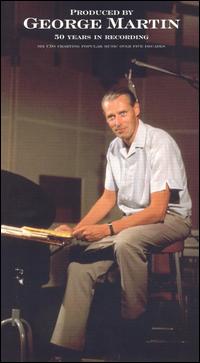This article relies largely or entirely on a single source .(May 2025) |
| Produced by George Martin | ||||
|---|---|---|---|---|
 | ||||
| Box set by | ||||
| Released | 17 July 2001 | |||
| Recorded | 1950–1997 | |||
| Genre | Various | |||
| Label | Parlophone (UK) Capitol (United States) | |||
| Producer | George Martin | |||
| George Martin chronology | ||||
| ||||
| Review scores | |
|---|---|
| Source | Rating |
| AllMusic | |
Produced by George Martin is a 2001 various artists compilation box set of tracks produced by Sir George Martin. It is also the title of a documentary film on George Martin co-produced by the BBC's Arena team and released in 2012 by Eagle Rock Entertainment on DVD and Blu-ray.
Contents
- Track listing
- Disc One (Crazy Rhythms)
- Disc Two (Transports of Delights)
- Disc Three (That Was the Decade That Was)
- Disc Four (Gold Fingers)
- Disc Five (Smiles of the Beyond)
- Disc Six (Nice Work)
- Single CD Track listing
- References
The audio box set was issued to commemorate Martin's 50-year career as a record producer. The recordings are not in chronological order but are instead grouped together by common themes.
A single CD compilation with highlights from this collection was released on 6 November 2006.
The film documentary was first aired by the BBC in the United Kingdom on 25 April 2011. It combines rare archive footage and new interviews with, among others, Paul McCartney, Ringo Starr, Jeff Beck, Cilla Black and Giles Martin. The DVD and Blu-ray was released worldwide on 10 September 2012 and includes over 50 minutes of out-takes and bonus interview footage from Rick Rubin, T-Bone Burnett and Ken Scott.